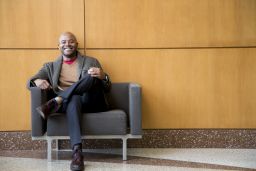Editor’s Note: Peniel E. Joseph is the Barbara Jordan chair in ethics and political values and the founding director of the Center for the Study of Race and Democracy at the LBJ School of Public Affairs at the University of Texas at Austin, where he is also a professor of history. He is the author of several books, most recently, “The Sword and the Shield: The Revolutionary Lives of Malcolm X and Martin Luther King Jr.” The views expressed here are his own. View more opinion articles on CNN.
A photo of Brandon Mitchell, one of the jurors in the Derek Chauvin trial, shows him wearing a Dr. Martin Luther King Jr. t-shirt emblazoned with the words, “Get your knee off our necks” for the March on Washington commemorative demonstration last year. Mitchell says he answered “no” on his juror questionnaire form when asked whether he attended “protests about police use of force or police brutality” and seemingly does not consider the 2020 March on Washington to be such a rally.

The controversy over Mitchell’s actions comes as Derek Chauvin’s attorney Eric Nelson attempts to gain a new trial after the former Minneapolis police officer was found guilty of third degree murder, second degree unintentional murder and second degree manslaughter in the death of George Floyd. Nelson cites allegations including mistakes by the judge, and misconduct by jurors and prosecution.
The photo has sparked predictable consternation with some describing Mitchell, a 31-year-old Minneapolis based high school basketball coach, as a BLM activist. Others have suggested the photo lays the groundwork for an appeal or new trial if the judge can be convinced that Mitchell lied on his juror disclosure form.
Give me a break.
A Black man wearing an MLK shirt should not be regarded as some kind of professional revolutionary. Yet somehow the photo of Mitchell is now being used as proof that he lacked the objectivity and impartiality required of the judicial system. Such a perspective holds a longstanding place in American history. One of the hallmarks of our nation’s Jim Crow system of racial segregation and White supremacy has been the historic exclusion of Blacks from serving on integrated juries. The legacy of this history of racially biased jury selection continues in our own time.
The racially integrated Chauvin trial stands out, in contrast to the jury acquittals of police officers accused of beating Rodney King in 1991 and the 1980 acquittal of White officers accused of killing Black motorist Arthur McDuffie, both for its makeup as well as the guilty verdict.
Suggestions that a Black person attending a civil rights demonstration lacks objectivity to serve on a jury trying White police accused of murdering an African American is offensive at best. In our racially divided and hyper-partisan society, seemingly every racial justice gathering is defined as a BLM rally. That movement, which began in 2013, inspired tsunami levels of activism, outrage, and policy advocacy in the aftermath of George Floyd’s death last year. BLM’s call to reimagine public safety has, in certain quarters, been reinterpreted as a full-scale attack on law enforcement. From this perspective Mitchell’s attendance at a March on Washington rally in the nation’s capital becomes recast as the excuse needed to let Derek Chauvin go free.
The scrutiny of Mitchell coincides with voter suppression and anti-protest legislation being debated nationally in statehouses across America. The GOP is the true avatar of so-called “cancel culture,” even as it claims to be its victim.
America now valorizes the original August 28, 1963 March on Washington as one of the nation’s civil rights landmarks. Around a quarter of a million Americans attended that demonstration and heard Dr. King’s famous “I Have a Dream” speech. Those who attended the 2020 commemoration in the nation’s capital were imbued with the same spirit of civic activism in service of equal justice that animated King’s era.
Get our free weekly newsletter
The focus on Mitchell’s apparent support of racial justice as impacting his ability to serve as a juror continues a racially discriminatory double-standard that plagues the criminal justice system. In a truly extraordinary sleight of hand with deep roots in our nation’s tragic racial history, Whites are somehow considered more “objective” on race matters than Blacks. This despite the fact that the framers of the Constitution and America’s founders placed racial slavery and White privilege at the center of our national political, economic, and democratic cultures. The fear that having Black faces in higher places would sully an otherwise ethical system of government, law and order, and commerce run by Whites refuses to go away. Black firsts, from President Barack Obama to CEOs, politicians to sports coaches, art museum directors to university presidents, must always navigate a racial tightrope to not appear too empathetic to the cause of racial justice.
If a White juror attended the same rally that Mitchell did wearing similar clothing, would there even be an uproar? More likely that juror would be seen as an American capable of civic action and impartiality in a manner that, in our popular imagination, Black people are incapable of. The inability for Black people to be seen as human beings is part of a broad continuum that brings us to this present era of racial reckoning and shows why three simple words, Black Lives Matter, remain so powerfully resonant.




